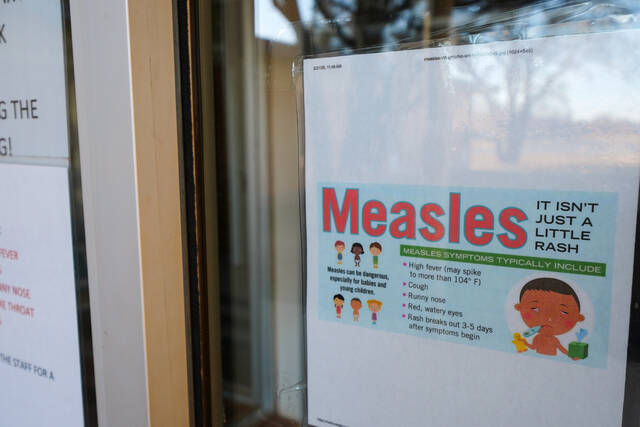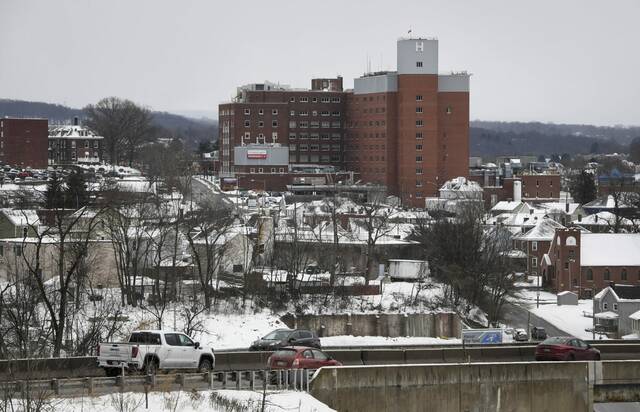A report released Thursday said Pittsburgh-based health care giant UPMC has gained too much share of the market and has too much power.
The American Economic Liberties Project, which produced the report, is a nonprofit group that formed to research consolidated corporate power and advocate for stronger antitrust regulations.
In an email, UPMC questioned the methodology of the report, but said it needed more time to fully assess the report before commenting further. The health system did note that it recently announced plans to raise its minimum wage to $18 an hour by 2025.
At a virtual news conference Thursday, U.S. Rep. Summer Lee, D-Swissvale, and state Rep. Sara Innamorato, D-Lawrenceville, spoke in support of the report and talked about how UPMC’s expansion over the past several years has affected its workforce.
They tied UPMC’s expansion and market consolidation to the organization’s persistent staffing shortages.
“They need more staffing and a voice at the table. Instead, hospital leaders have prioritized expansion and profit,” Innamorato said. “When workers see a brand-new hospital being built across the street, they tell me, ‘I wonder who is going to work in that one.’”
The report said UPMC has grown from a system of 12 hospitals into a network of 40 hospitals over the past 10 years. UPMC saw large profits at the start of the pandemic, but those numbers cooled in 2022 as losses in the stock market and costs associated with labor shortages cut into its profits.
The report said UPMC employs 67% of all hospital employees and has 60% of all licensed hospital beds in Allegheny County. Those figures are even higher within the city of Pittsburgh, where UPMC employs 76% of all hospital employees and has 71% of all licensed hospital beds.
Lee said this concentration gives UPMC too much control over the regional health care market and allows the organization to make decisions that can negatively impact local communities.
She spoke about her experience growing up in Braddock and said her family and others in the borough were hurt and left behind when the health system closed UPMC Braddock in 2010. UPMC East, a larger hospital in Monroeville, opened in 2012.
She said UPMC has expanded and grown so much that it is giving its workers fewer options for higher pay and better working conditions.
“UPMC monopoly powers have gone too far,” Lee said. “We have the ability to shift the balance of power to the workers.”
One of those workers is Katie Trombetta, a UPMC nurse who spoke at the news conference. She said her unit used to be staffed adequately, but many nurses have left UPMC to take higher-paying jobs as travel nurses.
Trombetta acknowledged UPMC’s announcement last week about raising its wages, but said that reaching an $18 an hour minimum wage in three years will keep UPMC workers in too low of a pay range and the organization will likely continue its worker shortage issues.
She said workers need more say in decisions UPMC makes and the organization should be friendlier to unionization efforts.
Trombetta said “$18 an hour in 2026 is essentially $16 an hour today, and that will keep workers below where they need to be.”
In a news release last week, UPMC said the new wage announcement also comes with a benefit package that will serve as the equivalent of workers earning $27 an hour. The organization said the move “solidifies its reputation as a highly desirable employer, with industry-leading total compensation packages, a focus on work-life balance and significant opportunities for career advancement.”
Pat Garofalo, director of state and local policy at the American Economic Liberties Project, said Pennsylvania needs to create its own antitrust laws and boost existing federal laws to ensure large health care groups like UPMC are held in check.
The report recommends a series of policies to enact on the state and federal level, including passing state laws to increase antitrust regulations, banning the use of noncompete agreements and opening investigations into UMPC’s tax-exempt status.
Innamorato, who is running for Allegheny County Executive, said she has circulated a memo in the state House to solicit support for her Open Markets Act, which looks to give a set of antitrust powers to the state Attorney General’s Office. Even though Republicans control the state Senate, she hopes to garner enough bipartisan support because her bill is an altered version of a bill first introduced by former state Sen. Stewart Greenleaf, R-Montgomery County.
“This legislation is built on a precedent that has been set before,” said Innamorato, who said that hospital consolidation has hurt rural areas, which are typically represented by Republicans.
On the federal level, Lee acknowledged the challenge of passing antitrust laws in the Republican-controlled House. She said she hopes to lean on federal agencies such as the Department of Justice and Federal Trade Commission to more aggressively enforce antitrust rules.











